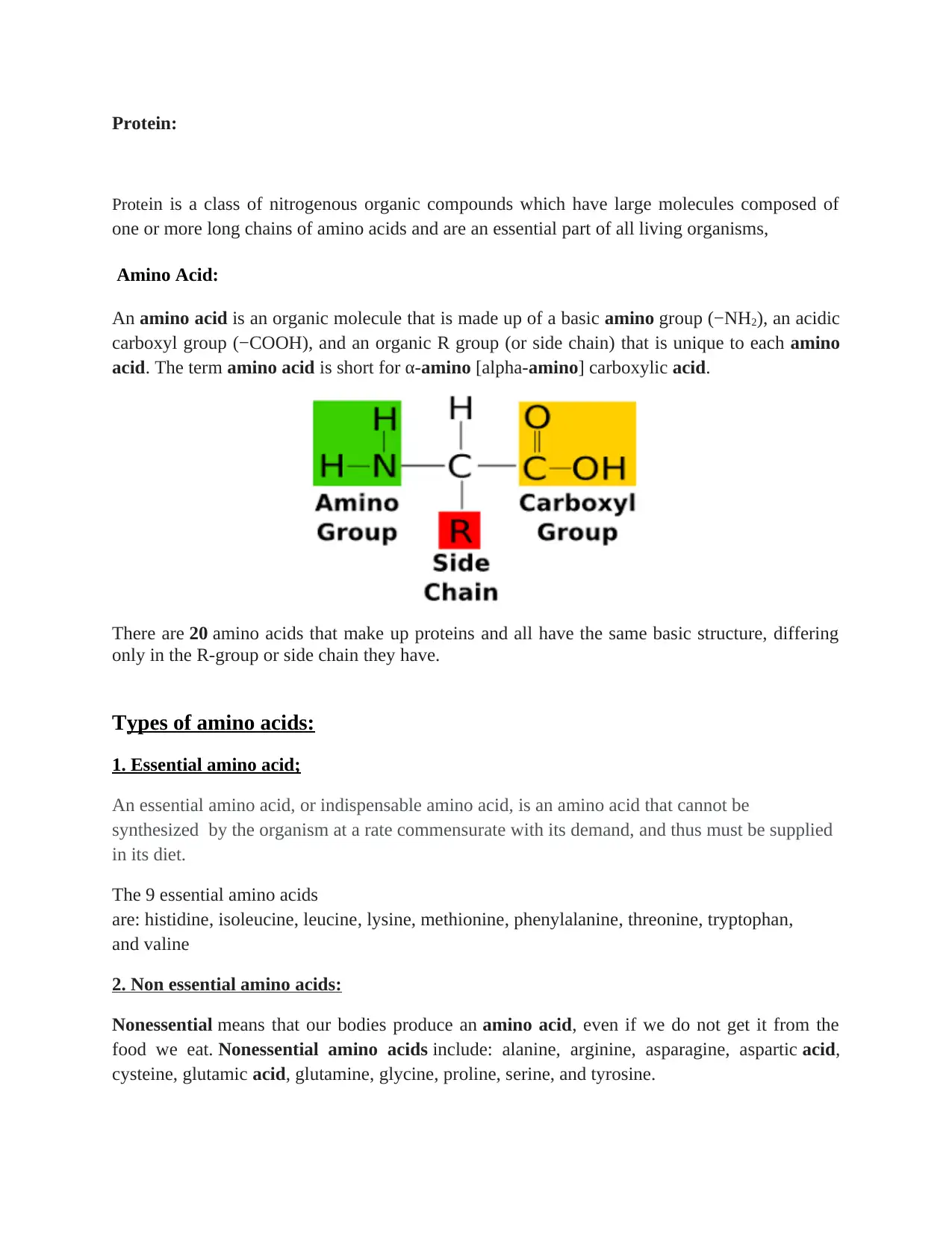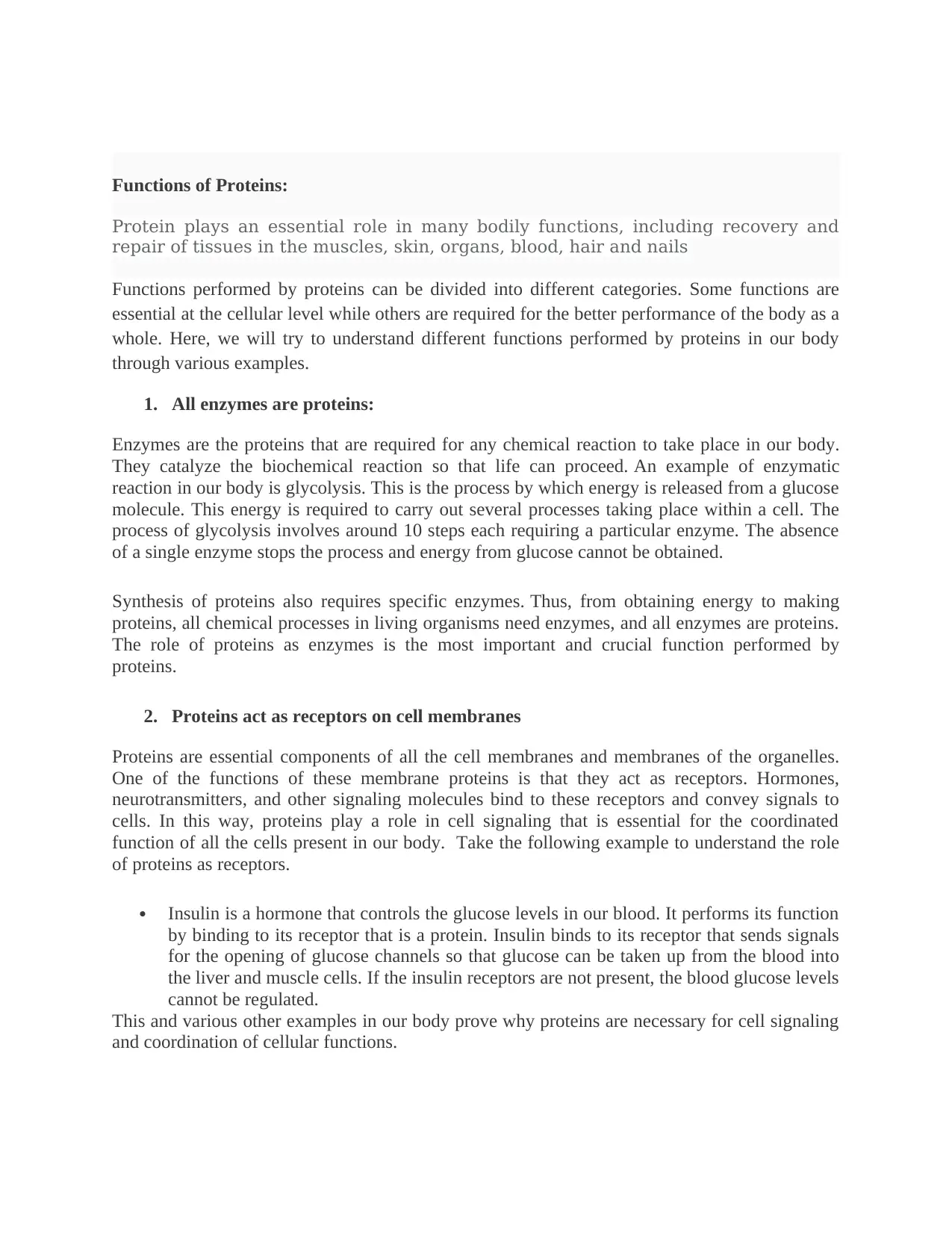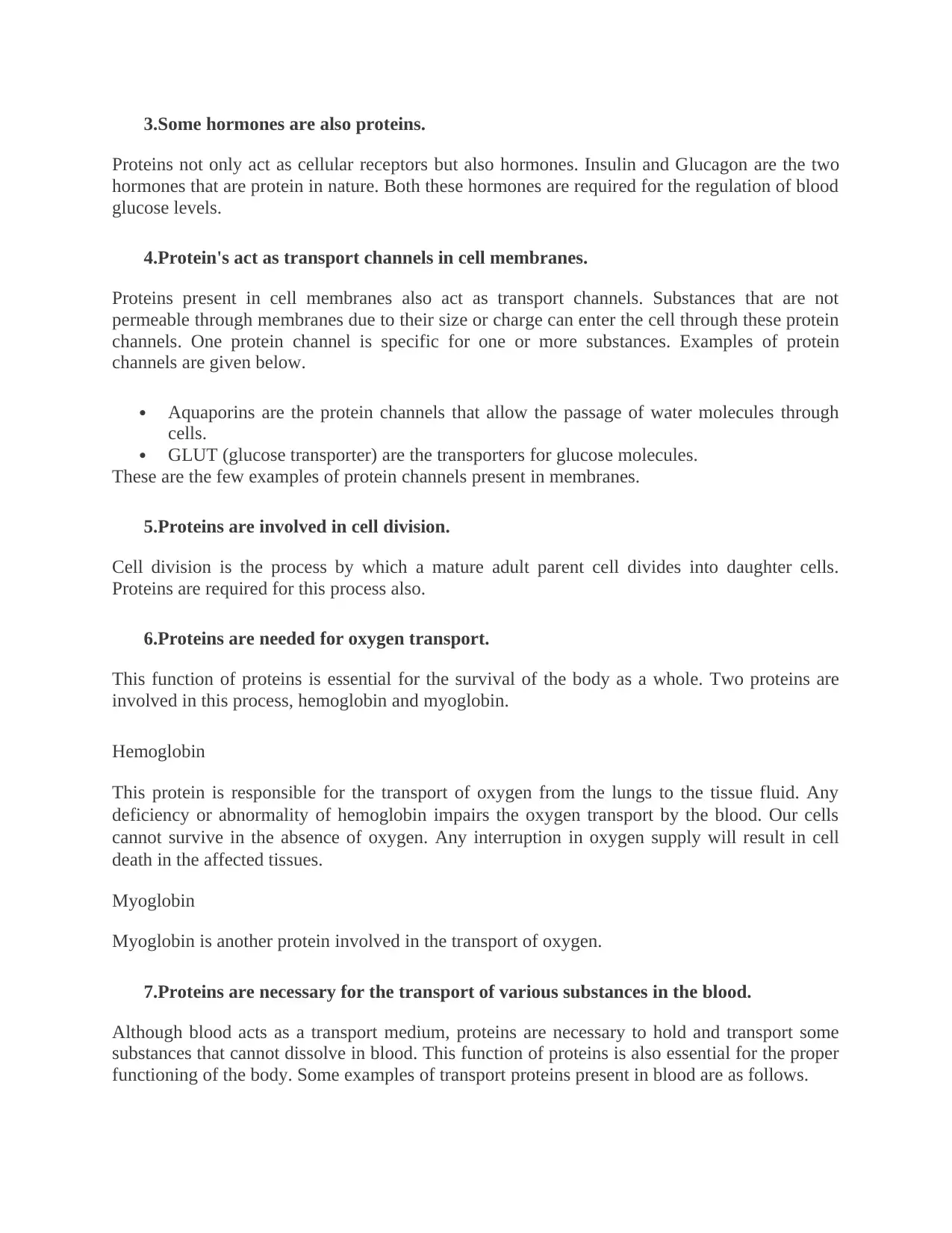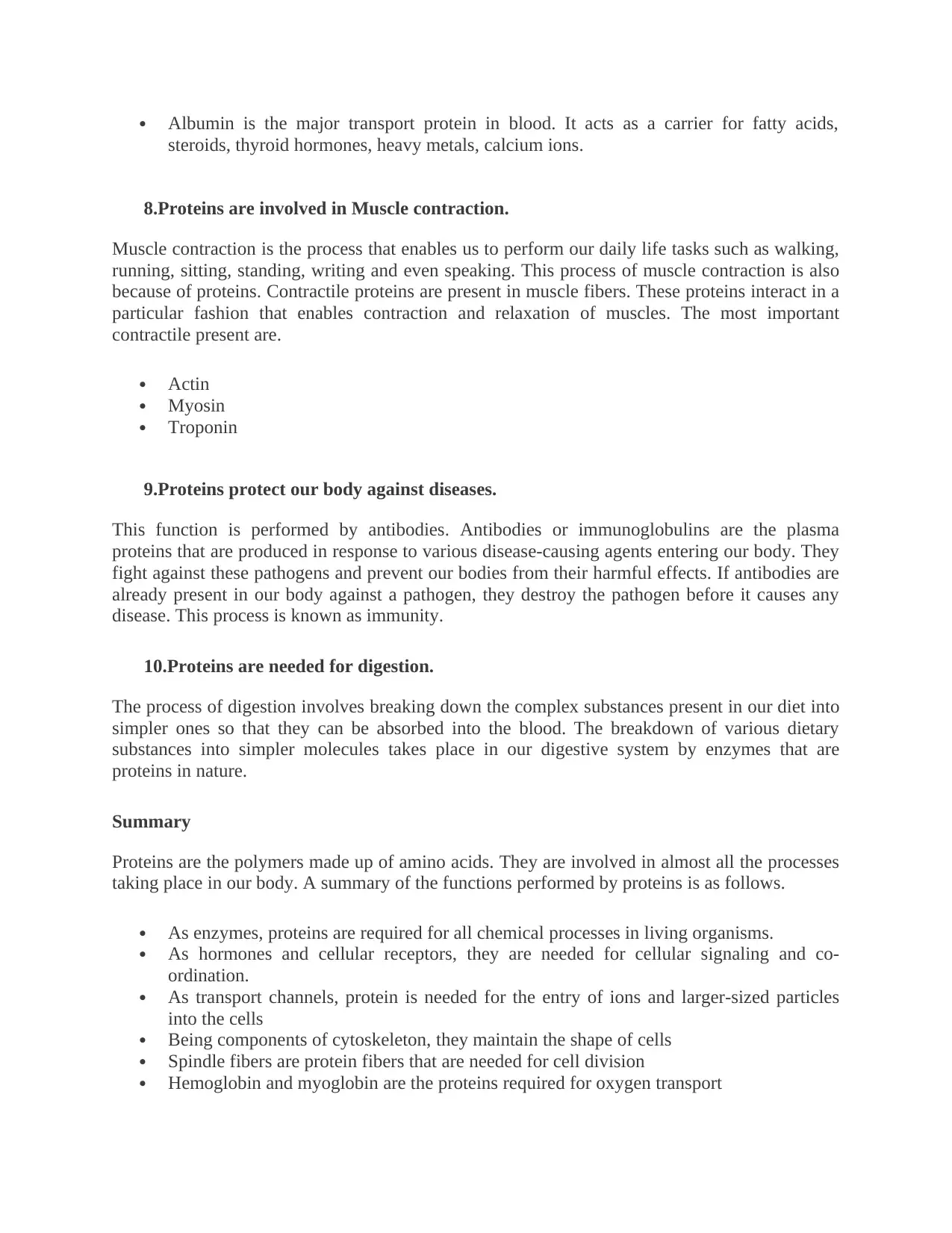Comprehensive Analysis of Protein Functions and Their Significance
VerifiedAdded on 2022/01/20
|5
|1457
|418
Homework Assignment
AI Summary
This assignment provides a comprehensive overview of proteins, which are large molecules composed of amino acids and are essential for all living organisms. It defines amino acids, differentiating between essential and non-essential types, and details their basic structure. The assignment then explores the diverse functions of proteins, including their role as enzymes in biochemical reactions, as receptors in cell membranes for cell signaling, and as hormones. It further discusses the functions of proteins as transport channels, in cell division, oxygen transport, and the transport of various substances in the blood. The role of proteins in muscle contraction and as antibodies for disease protection is also examined. The assignment concludes with a summary of the key functions performed by proteins in the human body, emphasizing their importance for various cellular and physiological processes. This document is available on Desklib, a platform offering AI-based study tools for students.

Protein:
Protein is a class of nitrogenous organic compounds which have large molecules composed of
one or more long chains of amino acids and are an essential part of all living organisms,
Amino Acid:
An amino acid is an organic molecule that is made up of a basic amino group (−NH2), an acidic
carboxyl group (−COOH), and an organic R group (or side chain) that is unique to each amino
acid. The term amino acid is short for α-amino [alpha-amino] carboxylic acid.
There are 20 amino acids that make up proteins and all have the same basic structure, differing
only in the R-group or side chain they have.
Types of amino acids:
1. Essential amino acid;
An essential amino acid, or indispensable amino acid, is an amino acid that cannot be
synthesized by the organism at a rate commensurate with its demand, and thus must be supplied
in its diet.
The 9 essential amino acids
are: histidine, isoleucine, leucine, lysine, methionine, phenylalanine, threonine, tryptophan,
and valine
2. Non essential amino acids:
Nonessential means that our bodies produce an amino acid, even if we do not get it from the
food we eat. Nonessential amino acids include: alanine, arginine, asparagine, aspartic acid,
cysteine, glutamic acid, glutamine, glycine, proline, serine, and tyrosine.
Protein is a class of nitrogenous organic compounds which have large molecules composed of
one or more long chains of amino acids and are an essential part of all living organisms,
Amino Acid:
An amino acid is an organic molecule that is made up of a basic amino group (−NH2), an acidic
carboxyl group (−COOH), and an organic R group (or side chain) that is unique to each amino
acid. The term amino acid is short for α-amino [alpha-amino] carboxylic acid.
There are 20 amino acids that make up proteins and all have the same basic structure, differing
only in the R-group or side chain they have.
Types of amino acids:
1. Essential amino acid;
An essential amino acid, or indispensable amino acid, is an amino acid that cannot be
synthesized by the organism at a rate commensurate with its demand, and thus must be supplied
in its diet.
The 9 essential amino acids
are: histidine, isoleucine, leucine, lysine, methionine, phenylalanine, threonine, tryptophan,
and valine
2. Non essential amino acids:
Nonessential means that our bodies produce an amino acid, even if we do not get it from the
food we eat. Nonessential amino acids include: alanine, arginine, asparagine, aspartic acid,
cysteine, glutamic acid, glutamine, glycine, proline, serine, and tyrosine.
Paraphrase This Document
Need a fresh take? Get an instant paraphrase of this document with our AI Paraphraser

Functions of Proteins:
Protein plays an essential role in many bodily functions, including recovery and
repair of tissues in the muscles, skin, organs, blood, hair and nails
Functions performed by proteins can be divided into different categories. Some functions are
essential at the cellular level while others are required for the better performance of the body as a
whole. Here, we will try to understand different functions performed by proteins in our body
through various examples.
1. All enzymes are proteins:
Enzymes are the proteins that are required for any chemical reaction to take place in our body.
They catalyze the biochemical reaction so that life can proceed. An example of enzymatic
reaction in our body is glycolysis. This is the process by which energy is released from a glucose
molecule. This energy is required to carry out several processes taking place within a cell. The
process of glycolysis involves around 10 steps each requiring a particular enzyme. The absence
of a single enzyme stops the process and energy from glucose cannot be obtained.
Synthesis of proteins also requires specific enzymes. Thus, from obtaining energy to making
proteins, all chemical processes in living organisms need enzymes, and all enzymes are proteins.
The role of proteins as enzymes is the most important and crucial function performed by
proteins.
2. Proteins act as receptors on cell membranes
Proteins are essential components of all the cell membranes and membranes of the organelles.
One of the functions of these membrane proteins is that they act as receptors. Hormones,
neurotransmitters, and other signaling molecules bind to these receptors and convey signals to
cells. In this way, proteins play a role in cell signaling that is essential for the coordinated
function of all the cells present in our body. Take the following example to understand the role
of proteins as receptors.
Insulin is a hormone that controls the glucose levels in our blood. It performs its function
by binding to its receptor that is a protein. Insulin binds to its receptor that sends signals
for the opening of glucose channels so that glucose can be taken up from the blood into
the liver and muscle cells. If the insulin receptors are not present, the blood glucose levels
cannot be regulated.
This and various other examples in our body prove why proteins are necessary for cell signaling
and coordination of cellular functions.
Protein plays an essential role in many bodily functions, including recovery and
repair of tissues in the muscles, skin, organs, blood, hair and nails
Functions performed by proteins can be divided into different categories. Some functions are
essential at the cellular level while others are required for the better performance of the body as a
whole. Here, we will try to understand different functions performed by proteins in our body
through various examples.
1. All enzymes are proteins:
Enzymes are the proteins that are required for any chemical reaction to take place in our body.
They catalyze the biochemical reaction so that life can proceed. An example of enzymatic
reaction in our body is glycolysis. This is the process by which energy is released from a glucose
molecule. This energy is required to carry out several processes taking place within a cell. The
process of glycolysis involves around 10 steps each requiring a particular enzyme. The absence
of a single enzyme stops the process and energy from glucose cannot be obtained.
Synthesis of proteins also requires specific enzymes. Thus, from obtaining energy to making
proteins, all chemical processes in living organisms need enzymes, and all enzymes are proteins.
The role of proteins as enzymes is the most important and crucial function performed by
proteins.
2. Proteins act as receptors on cell membranes
Proteins are essential components of all the cell membranes and membranes of the organelles.
One of the functions of these membrane proteins is that they act as receptors. Hormones,
neurotransmitters, and other signaling molecules bind to these receptors and convey signals to
cells. In this way, proteins play a role in cell signaling that is essential for the coordinated
function of all the cells present in our body. Take the following example to understand the role
of proteins as receptors.
Insulin is a hormone that controls the glucose levels in our blood. It performs its function
by binding to its receptor that is a protein. Insulin binds to its receptor that sends signals
for the opening of glucose channels so that glucose can be taken up from the blood into
the liver and muscle cells. If the insulin receptors are not present, the blood glucose levels
cannot be regulated.
This and various other examples in our body prove why proteins are necessary for cell signaling
and coordination of cellular functions.

3.Some hormones are also proteins.
Proteins not only act as cellular receptors but also hormones. Insulin and Glucagon are the two
hormones that are protein in nature. Both these hormones are required for the regulation of blood
glucose levels.
4.Protein's act as transport channels in cell membranes.
Proteins present in cell membranes also act as transport channels. Substances that are not
permeable through membranes due to their size or charge can enter the cell through these protein
channels. One protein channel is specific for one or more substances. Examples of protein
channels are given below.
Aquaporins are the protein channels that allow the passage of water molecules through
cells.
GLUT (glucose transporter) are the transporters for glucose molecules.
These are the few examples of protein channels present in membranes.
5.Proteins are involved in cell division.
Cell division is the process by which a mature adult parent cell divides into daughter cells.
Proteins are required for this process also.
6.Proteins are needed for oxygen transport.
This function of proteins is essential for the survival of the body as a whole. Two proteins are
involved in this process, hemoglobin and myoglobin.
Hemoglobin
This protein is responsible for the transport of oxygen from the lungs to the tissue fluid. Any
deficiency or abnormality of hemoglobin impairs the oxygen transport by the blood. Our cells
cannot survive in the absence of oxygen. Any interruption in oxygen supply will result in cell
death in the affected tissues.
Myoglobin
Myoglobin is another protein involved in the transport of oxygen.
7.Proteins are necessary for the transport of various substances in the blood.
Although blood acts as a transport medium, proteins are necessary to hold and transport some
substances that cannot dissolve in blood. This function of proteins is also essential for the proper
functioning of the body. Some examples of transport proteins present in blood are as follows.
Proteins not only act as cellular receptors but also hormones. Insulin and Glucagon are the two
hormones that are protein in nature. Both these hormones are required for the regulation of blood
glucose levels.
4.Protein's act as transport channels in cell membranes.
Proteins present in cell membranes also act as transport channels. Substances that are not
permeable through membranes due to their size or charge can enter the cell through these protein
channels. One protein channel is specific for one or more substances. Examples of protein
channels are given below.
Aquaporins are the protein channels that allow the passage of water molecules through
cells.
GLUT (glucose transporter) are the transporters for glucose molecules.
These are the few examples of protein channels present in membranes.
5.Proteins are involved in cell division.
Cell division is the process by which a mature adult parent cell divides into daughter cells.
Proteins are required for this process also.
6.Proteins are needed for oxygen transport.
This function of proteins is essential for the survival of the body as a whole. Two proteins are
involved in this process, hemoglobin and myoglobin.
Hemoglobin
This protein is responsible for the transport of oxygen from the lungs to the tissue fluid. Any
deficiency or abnormality of hemoglobin impairs the oxygen transport by the blood. Our cells
cannot survive in the absence of oxygen. Any interruption in oxygen supply will result in cell
death in the affected tissues.
Myoglobin
Myoglobin is another protein involved in the transport of oxygen.
7.Proteins are necessary for the transport of various substances in the blood.
Although blood acts as a transport medium, proteins are necessary to hold and transport some
substances that cannot dissolve in blood. This function of proteins is also essential for the proper
functioning of the body. Some examples of transport proteins present in blood are as follows.
⊘ This is a preview!⊘
Do you want full access?
Subscribe today to unlock all pages.

Trusted by 1+ million students worldwide

Albumin is the major transport protein in blood. It acts as a carrier for fatty acids,
steroids, thyroid hormones, heavy metals, calcium ions.
8.Proteins are involved in Muscle contraction.
Muscle contraction is the process that enables us to perform our daily life tasks such as walking,
running, sitting, standing, writing and even speaking. This process of muscle contraction is also
because of proteins. Contractile proteins are present in muscle fibers. These proteins interact in a
particular fashion that enables contraction and relaxation of muscles. The most important
contractile present are.
Actin
Myosin
Troponin
9.Proteins protect our body against diseases.
This function is performed by antibodies. Antibodies or immunoglobulins are the plasma
proteins that are produced in response to various disease-causing agents entering our body. They
fight against these pathogens and prevent our bodies from their harmful effects. If antibodies are
already present in our body against a pathogen, they destroy the pathogen before it causes any
disease. This process is known as immunity.
10.Proteins are needed for digestion.
The process of digestion involves breaking down the complex substances present in our diet into
simpler ones so that they can be absorbed into the blood. The breakdown of various dietary
substances into simpler molecules takes place in our digestive system by enzymes that are
proteins in nature.
Summary
Proteins are the polymers made up of amino acids. They are involved in almost all the processes
taking place in our body. A summary of the functions performed by proteins is as follows.
As enzymes, proteins are required for all chemical processes in living organisms.
As hormones and cellular receptors, they are needed for cellular signaling and co-
ordination.
As transport channels, protein is needed for the entry of ions and larger-sized particles
into the cells
Being components of cytoskeleton, they maintain the shape of cells
Spindle fibers are protein fibers that are needed for cell division
Hemoglobin and myoglobin are the proteins required for oxygen transport
steroids, thyroid hormones, heavy metals, calcium ions.
8.Proteins are involved in Muscle contraction.
Muscle contraction is the process that enables us to perform our daily life tasks such as walking,
running, sitting, standing, writing and even speaking. This process of muscle contraction is also
because of proteins. Contractile proteins are present in muscle fibers. These proteins interact in a
particular fashion that enables contraction and relaxation of muscles. The most important
contractile present are.
Actin
Myosin
Troponin
9.Proteins protect our body against diseases.
This function is performed by antibodies. Antibodies or immunoglobulins are the plasma
proteins that are produced in response to various disease-causing agents entering our body. They
fight against these pathogens and prevent our bodies from their harmful effects. If antibodies are
already present in our body against a pathogen, they destroy the pathogen before it causes any
disease. This process is known as immunity.
10.Proteins are needed for digestion.
The process of digestion involves breaking down the complex substances present in our diet into
simpler ones so that they can be absorbed into the blood. The breakdown of various dietary
substances into simpler molecules takes place in our digestive system by enzymes that are
proteins in nature.
Summary
Proteins are the polymers made up of amino acids. They are involved in almost all the processes
taking place in our body. A summary of the functions performed by proteins is as follows.
As enzymes, proteins are required for all chemical processes in living organisms.
As hormones and cellular receptors, they are needed for cellular signaling and co-
ordination.
As transport channels, protein is needed for the entry of ions and larger-sized particles
into the cells
Being components of cytoskeleton, they maintain the shape of cells
Spindle fibers are protein fibers that are needed for cell division
Hemoglobin and myoglobin are the proteins required for oxygen transport
Paraphrase This Document
Need a fresh take? Get an instant paraphrase of this document with our AI Paraphraser

Albumin and other plasma proteins are needed for the transport of lipids, drugs and other
substances in the blood
Contractile proteins are needed for muscle contraction
Antibodies are the proteins that protect our bodies from harmful disease
Plasma proteins maintain fluid balance in our body
They regulate gene expression
Proteins also provide energy to the body in times of starvation
substances in the blood
Contractile proteins are needed for muscle contraction
Antibodies are the proteins that protect our bodies from harmful disease
Plasma proteins maintain fluid balance in our body
They regulate gene expression
Proteins also provide energy to the body in times of starvation
1 out of 5
Related Documents
Your All-in-One AI-Powered Toolkit for Academic Success.
+13062052269
info@desklib.com
Available 24*7 on WhatsApp / Email
![[object Object]](/_next/static/media/star-bottom.7253800d.svg)
Unlock your academic potential
Copyright © 2020–2026 A2Z Services. All Rights Reserved. Developed and managed by ZUCOL.





